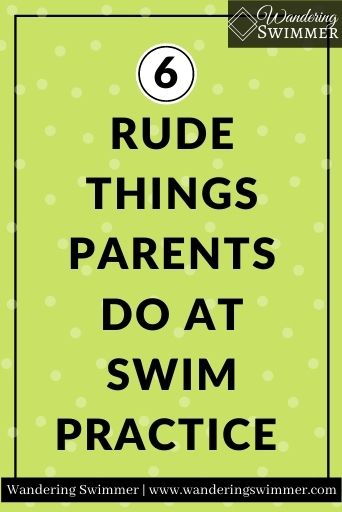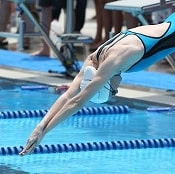At swim practice, there’s always one parent that has rude tendencies. And while they might not realize what they’re doing, it’s obvious to everyone else. Whether you’re new to swimming or not, here are the rudest things parents can do at swim practice.
Related article: Practice Etiquette for Swim Parents
Disclosure: This post may contain affiliate links, meaning we earn a small commission at no cost to you if you purchase something through one of our links. As an Amazon Associate, we earn from qualifying purchases. Please check out our disclosure page for more information.

Criticize Other Swimmers
There are several things wrong with criticizing other swimmers. Whether they’re from your child’s team or on a different team. Not only is it one of the rudest things parents can do, but it’s also incredibly malicious, and completely uncalled for.
And we’ll take it one step further. You shouldn’t be criticizing your child, either. That’s a surefire way to make them feel discouraged and want to quit.
As a parent, your job isn’t to criticize what you think other swimmers (or your child) are doing wrong. Just as it’s not your job to ‘parent’ them.
If you see another swimmer doing what you think is an incorrect technique, it’s not your place to judge them, make a snide comment, or laugh.
Related article: 9 Words Swim Parents Should Know
The same holds true outside of the pool too. Parents should never make nasty or throw away comments about another swimmer based on their economical, personal, religious, or family background.
Acting in this way only shows your true colors. And even if you meant something in a ‘joking’ manner, everyone else knows that you meant it honestly.
So do everyone a favor. Keep your comments, sarcastic, demeaning, and negative remarks to yourself. And if you can’t do that? You shouldn’t be staying at swim practice.
Trying to be the Coach
It’s easy to say you know your child best and that you want to give them advice. But with swimming, it’s best to leave the advice-giving to the coach. That’s what you pay them for, after all!
Can you give them advice and help them calm down before their first swim practice or meet? Of course! Just as you can console them after a bad practice or meet.
But when it comes to actual stroke work and training? Your swimmer should listen to the coach. They have the experience and knowledge of the sport that most parents typically don’t have.
Related article: New Year’s Resolutions for Swim Parents
When parents try to coach, their advice oftentimes conflicts with whatever the coach is saying. And this can lead to confused swimmers, especially younger ones.
It’s tempting, we know. But you can end up sabotaging your swimmer if you try to be the coach. Even if you were trying to come from a good place.
Skipping Dues
This pertains more to swimmers in year-round club swimming than high school swimming. But not paying your monthly dues (or any type of dues that the team requires) is one of the rudest things swim parents can do
These dues at a minimum cover:
- Natatorium upkeep
- Rent or mortgage for the natatorium
- Salary for all coaching staff
- Purchasing training equipment (power racks, bungees, chutes, etc.)
- Contribute to team trips
Not paying your dues is the same as not paying a bill. You’re paying for a service and you need to ensure that you follow through with your promise of payment.
If you’re going to be late or if you can’t make a payment that month, let the coach know. It can be hard and embarrassing to do so, but it’s the right thing to do. And it keeps you from looking shady.
Related article: Competitive Swimming on a Budget
Causing a Distraction
Swim parents can do several different things to cause a distraction. It’s one of the reasons why you shouldn’t stay at your child’s swim practice.
When you do things such as talking to your swimmer or the coach during practice, it causes a distraction. It takes the focus away from the practice itself and can cause swimmers to miss sets. Or it can make the coach miss intervals or watching stroke technique.
Parents can also distract from practice by:
- Trying to coach from the sidelines
- Having a loud conversation when the coach is providing instruction/feedback
- Bringing a child to practice and letting them run around and/or scream
They might seem like insignificant issues, but to the coach and other swimmers, it’s an annoyance. And during the times that they’re not swimming, it makes it difficult to focus.
For some swimmers, having parents at a practice alone is distracting enough. It’s one of the reasons some teams don’t allow parents to stay during practice. If you’re not sure what your team’s rules are regarding this practice, be sure to ask!
Being Rude to Other Parents
One of the rudest things parents can do is be rude to other parents!
Yes, we know everyone can’t get along with every parent on the swim team. But you can still be respectful to those that you don’t see eye-to-eye with.
Some of the best ways to be respectful are through simple things, such as holding the door open for someone behind you. Or asking another parent how their day was or just saying ‘hello’.
When you’re impolite to other parents, it tends to create a negative environment for everyone involved. The rest of the parents on the team will tend to avoid you and even the swimmers can pick up on disrespectful attitudes.
One way parents can be rude to other parents is by acting negatively towards their swimmer. Or making insulting statements toward their child. While this falls under our first rude thing parents can do, it’s worth repeating.
Your actions or comments might not be directed at a parent. But when you target their child, you’re still acting in an uncivil manner towards them.
Spreading Gossip/Lies
Swimmers, parents, and coaches are not immune from talking about others. Sometimes it’s honest and factful, such as how someone did at a recent meet. Other times though, it edges into the territory of gossip and lies.
And we daresay that swim parents are probably the worst at gossiping out of the three!
Again, we get it. It’s hard not to talk about something that you heard. Even if you’re not sure it’s correct. But the story has a way of getting out of hand and even though it starts innocent, it can quickly spiral out of control.
One of the best ways to avoid this is to refrain from making statements about individuals as best you can. Especially if you don’t know the full story. Listening and joining into these types of conversations is what makes it gossip. And you only perpetuate the problem.
Related article: Healthy Swim Habits for Parents
If you can, remove yourself from the conversation if you feel it’s turning in a negative way.
While on the subject of gossiping, another one of the rudest things parents can do at swim practice is spread lies. Purposely spreading lies to cast another family, coach, or swimmer in a bad light reflects poorly on you. And it’s just downright nasty to do.
Even if you don’t like a swimmer or their family, it’s no reason to drag their name through the mud.
As the old saying goes: “if you can’t say anything nice, don’t say anything at all.” And if that’s difficult to do for you, it might be best to avoid swim practice or that individual altogether 🙂
As always, to happy swimming!
Chevron
Bonus Content:
8 Things to do During Your Child’s Swim Practice: One good thing about swim practice for parents? It gives you the gift of time. Here are eight things you can do during your child’s swim practice.

Want to Improve at the Pool?
Join swimmers and swim parents to receive my free newsletter and receive a free Swimming Glossary e-book as a thanks!
Every month you’ll receive tips and coaching to help you find success at the pool.
About
About

Chevron is a current competitive swimmer with almost 20 years of experience in the pool. And although she fell into the sport by accident in her high school years, she still trains daily and competes throughout the year. She’s committed to providing guidance to all levels of swimmers and believes that everyone should know how to swim.